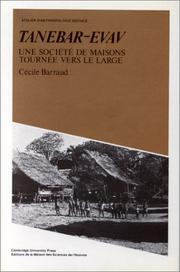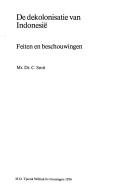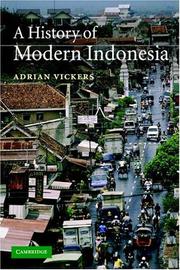| Listing 1 - 10 of 981 | << page >> |
Sort by
|
Book
ISBN: 9068328549 Year: 2005 Publisher: Amsterdam KIT
Abstract | Keywords | Export | Availability | Bookmark
 Loading...
Loading...Choose an application
- Reference Manager
- EndNote
- RefWorks (Direct export to RefWorks)

ISBN: 2735119718 290172566X Year: 2016 Publisher: Paris : Éditions de la Maison des sciences de l’homme,
Abstract | Keywords | Export | Availability | Bookmark
 Loading...
Loading...Choose an application
- Reference Manager
- EndNote
- RefWorks (Direct export to RefWorks)
Dans l'archipel des Moluques, les îles Kei sont encore mal connues. A l'extrémité sud-ouest du groupe se trouve Tanebar-Evav, une petite île où vit une société de moins de mille personnes. Ici comme dans d'autres régions d'Indonésie, la maison est l'unité sociale fondamentale, le foyer et l'acteur de toutes les relations. Les maisons sont parties prenantes et donnantes dans tous les événements sociaux: mariages, funérailles, rituels saisonniers et occasionnels, et s'entraident en toute chose. Entourant les maisons, l'espace du village est fortement structuré, avec ses murs d'enceinte, ses portes, ses places, ses lieux marqués par les mythes des origines. Il est de plus imprégné de deux conceptions distinctes et complémentaires de la société, vue d'un côté dans ses lois internes et sa particularité - haratut -, de l'autre dans sa relation au dehors et à la loi universelle - lór. Cette double référence articule tous les niveaux de l'organisation sociale qui combine dans une structure complexe des traits relatifs à la filiation et à l'aînesse d'une part, à l'alliance asymétrique et à la relation frère-soeur de l'autre. Dans ce système, les maisons constituent les unités concrètes d'un ordre immédiat et permanent au nom duquel se maintient une société attachée à son identité, mais animée aussi par une très ancienne et profonde relation au monde et à l'histoire. The islands of Kei in the Moluccan archipelago are little known. This is a study of one of them - Tanebar-Evav - a small isolated island of fewer than 1000 inhabitants, situated at the south-west end of the archipelago. Cécile Barraud has carried out an intensive study of this small community, and has made a detailed analysis of its social organisation. Here, as in other parts of Indonesia, the fundamental social unit is the house, which is the agent and the focal point of all social relations. The houses are partners of exchange in all social events: marriages, funerals, seasonal rituals and others. They are…
Asian Studies --- Ethnic Studies --- Indonésie --- Tanebar-Evav --- coutumes --- parenté
Periodical
ISSN: 08521883 25413007 Publisher: Yogyakarta : Universitas Atma Jaya, Fakultas Hukum
Abstract | Keywords | Export | Availability | Bookmark
 Loading...
Loading...Choose an application
- Reference Manager
- EndNote
- RefWorks (Direct export to RefWorks)
legal system --- civil law --- criminal law --- islamic law --- international law --- Law --- Indonesië.

ISBN: 9001802893 Year: 1976 Publisher: Groningen Tjeenk Willink
Abstract | Keywords | Export | Availability | Bookmark
 Loading...
Loading...Choose an application
- Reference Manager
- EndNote
- RefWorks (Direct export to RefWorks)
History of Asia --- Colonisation. Decolonisation --- Indonesia --- Statesmen --- Dutch --- Hommes d'Etat --- Néerlandais --- Biography. --- Biographies --- Papua (Indonesia) --- Indonésie --- Papouasie occidentale (Indonésie) --- History --- History. --- Histoire --- Dekolonisatie ; Indonesië --- Néerlandais --- Indonésie --- Papouasie occidentale (Indonésie) --- Public officers --- Dutchmen (Dutch people) --- Hollanders --- Ethnology --- Tanah Papua (Indonesia) --- West New Guinea (Indonesia) --- Provinsi Papua (Indonesia) --- Papua Province (Indonesia) --- Province of Papua (Indonesia) --- Irian Jaya (Indonesia) --- Irian Jaya Barat (Indonesia)
Book
ISBN: 2355960011 6169028246 Year: 2018 Publisher: Bangkok : Institut de recherche sur l’Asie du Sud-Est contemporaine,
Abstract | Keywords | Export | Availability | Bookmark
 Loading...
Loading...Choose an application
- Reference Manager
- EndNote
- RefWorks (Direct export to RefWorks)
The history of the Prosperous Justice Party (PKS) is part of the longstanding tradition of political Islam in Indonesia. Born in 1912 with the foundation of the Union of Muslim Traders (Sarekat Dagang Islam) this trend dominated the emerging nationalism in the Dutch East Indies for nearly twenty years. This initial momentum lies at the the origin of the two-dimensional Islamist project: to islamicise society by cleansing Islam of all practices considered to be impure; to mobilise the electorate by invoking Islamic values and their necessary implementation. Indeed, the birth and development of political Islam was closely linked to the reformist Muslim movement which in religious, cultural and social matters attempted to face the colonial challenge through a religious surge. In Indonesia, the Muhammadiyah, founded in 1912, and the Persatuan Islam, founded in 1923, provided most of the early generations of activists. During the decade after independence, militant Islam played a leading role in Indonesian politics. Between 1945 and 1960, the Masjumi party, which brought together most Muslim organisations, was one of the main government components and thereby constituted the matrix of political Islam in Indonesia to which the current generation of activists still refer. The discussions conducted within this party, especially the delicate compromises made between divine law and people's democracy, preconfigured the present debates conducted by Islamic parties. Like the current leaders of the PKS, this first generation of “government Islamists” was also confronted with economic and social modernity issues such as those related to the role of the West in this process. As the two following contributions remind us, its failure is mainly due to domestic reasons that in turn heavily influenced the way Indonesian Islam later considered these issues. Banned by President Sukarno and marginalised by the emerging New Order, the proponents of militant Islam had no choice but to…
Asian Studies --- politique --- religion --- Islam --- islam politique --- élections --- Indonésie --- Frères musulmans --- politics --- Indonesia --- Prosperous Justice Party --- PKS --- Tarbiyah Da'wa Movement --- political islam --- muslim Brotherhood
Periodical
ISSN: 27229408 Year: 2003 Publisher: Yogyakarta Pusat Kajian Bahasa, Sastra, dan Kebudayaan Indonesia, Jurusan Sastra Indonesia, Universitas Sanata Dharma
Abstract | Keywords | Export | Availability | Bookmark
 Loading...
Loading...Choose an application
- Reference Manager
- EndNote
- RefWorks (Direct export to RefWorks)
Studies on language, literature, literary criticism, and culture in Indonesia
Indonesian literature --- Indonesian language --- Indonesia --- Civilization --- Bahasa Indonesia --- Malayan languages --- Malay language --- Indonésien (Langue) --- Littérature indonésienne --- Lengua indonesia --- Literatura indonesia --- Indonésie --- Civilisation --- Civilización

ISBN: 9780521542623 9780521834933 9780511801020 0521542626 0521542626 0521834937 0511134312 9780511134319 0511134924 9780511134920 9780511201318 0511201311 9780511137099 0511137095 0511801025 1280308915 9781280308918 9786610308910 6610308918 0511311540 9780511311543 1107149673 Year: 2005 Publisher: Cambridge : Cambridge University Press,
Abstract | Keywords | Export | Availability | Bookmark
 Loading...
Loading...Choose an application
- Reference Manager
- EndNote
- RefWorks (Direct export to RefWorks)
Although Indonesia has the fourth largest population in the world, its history is still relatively unfamiliar and understudied. Guided by the life and writings of the country's most famous author, Pramoedya Ananta Toer, Adrian Vickers takes the reader on a journey across the social and political landscape of twentieth-century Indonesia in this innovative and timely account. He begins by explaining the country's origins under the Dutch in the early part of that century, the subsequent anti-colonial struggle and revolution which led to independence in 1949. Thereafter the spotlight is on the 1950s, a crucial period in the formation of Indonesia as a new nation, which was followed by the Sukarno years, and the anti-communist massacres of the 1960s when General Suharto took over as president. The concluding chapters chart the fall of Suharto's New Order after thirty two years in power, and the subsequent political and religious turmoil which culminated in the Bali bombings in 2002. Drawing on insights from literature, art and anthropology, Adrian Vickers portrays a complex and resilient people borne out of a troubled past.
959.4 --- 959.4 Geschiedenis van Indonesië --- Geschiedenis van Indonesië --- Indonesia --- History --- Politics and government --- S31/0400 --- Indo China and South East Asia--South East Asia general (Philippines, Malaysia, Indonesia, Burma, Papua New Guinea) --- Indonésie --- Histoire --- Politique et gouvernement --- 5.580. --- Arts and Humanities --- Indonesia - History - 20th century --- Indonesia - Politics and government - 20th century
Book
ISBN: 1316464253 1316465039 1316464644 1316466590 1316407578 1107124379 1107561647 9781107561649 1316461521 Year: 2016 Publisher: Cambridge : Cambridge University Press,
Abstract | Keywords | Export | Availability | Bookmark
 Loading...
Loading...Choose an application
- Reference Manager
- EndNote
- RefWorks (Direct export to RefWorks)
Given the brutality of mass atrocities, it is no wonder that one question dominates research and policy: what can we, who are not at risk, do to prevent such violence and hasten endings? But this question skips a more fundamental question for understanding the trajectory of violence: how do mass atrocities actually end? This volume presents an analysis of the processes, decisions, and factors that help bring about the end of mass atrocities. It includes qualitatively rich case studies from Burundi, Guatemala, Indonesia, Sudan, Bosnia, and Iraq, drawing patterns from wide-ranging data. As such, it offers a much needed correction to the popular 'salvation narrative' framing mass atrocity in terms of good and evil. The nuanced, multidisciplinary approach followed here represents not only an essential tool for scholars, but an important step forward in improving civilian protection.
Atrocities --- Genocide --- Cleansing, Ethnic --- Ethnic cleansing --- Ethnic purification --- Ethnocide --- Purification, Ethnic --- Crime --- Military atrocities --- Cruelty --- War crimes --- Prevention --- Atrocities - Prevention - Case studies --- Genocide - Prevention - Case studies --- Atrocities - Case studies --- Genocide - Case studies --- Guatemala --- Burundi --- Indonésie --- Soudan --- Bosnie-Et-Herzégovine --- Iraq
Periodical
ISSN: 20573049 Publisher: London, UK : London, UK : Fitch Solutions BMI
Abstract | Keywords | Export | Availability | Bookmark
 Loading...
Loading...Choose an application
- Reference Manager
- EndNote
- RefWorks (Direct export to RefWorks)
Malaysia --- Philippines --- Indonesia --- Singapore --- Southeast Asia --- Malaisie --- Philippines --- Indonésie --- Asie du Sud-Est --- Indonesia. --- Malaysia. --- Philippines. --- Singapore. --- Southeast Asia. --- Economic conditions --- Economic conditions --- Economic conditions --- Economic conditions --- Economic conditions --- Conditions économiques --- Conditions économiques --- Conditions économiques --- Conditions économiques
Book

ISBN: 9789004168664 9004168664 9786612949296 9004190171 1282949292 9789004190177 Year: 2010 Volume: 19 Publisher: Leiden ; Boston : Brill.
Abstract | Keywords | Export | Availability | Bookmark
 Loading...
Loading...Choose an application
- Reference Manager
- EndNote
- RefWorks (Direct export to RefWorks)
An obvious hiatus amidst the abundance of Pacific War studies is the story of Indonesia during that period. The Encyclopedia of Indonesia in the Pacific War, edited under the aegis of the Netherlands Institute for War Documentation, now fills that gap. This state of the art work reflects the different experiences and historiographic traditions of Indonesians, Japanese, and Dutch. The aim is to present the developments in the Indonesian archipelago in as much a rational and dispassionate way as possible, taking into account regional and social variations and interpreting them within the international context of pre- and post-war trends. With due acknowledgement of different perspectives, ambiguities, unresolved issues and conflicting views, it sets out to enhance mutual understanding and academic dialogue. To download the brochure, please click here . Choice’s Outstanding Academic Title 2010.
World War, 1939-1945 --- 2ème guerre mondiale --- Encyclopedias. --- Encyclopédies --- Indonesia --- Indonésie --- History --- Histoire --- 940.53 --- 959.4 --- J3388 --- S31/0400 --- J3991.28 --- Geschiedenis van Europa: Tweede Wereldoorlog--(1939-1945) (algemeen) --- Geschiedenis van Indonesië --- Japan: History -- Gendai, modern -- Shōwa period -- World War II -- Pacific war (1941-1945) --- Indo China and South East Asia--South East Asia general (Philippines, Malaysia, Indonesia, Burma, Papua New Guinea) --- Asia: History and geography of Indonesia (Dutch East Indies), East Timor and Papua New Guinea --- 959.4 Geschiedenis van Indonesië --- 940.53 Geschiedenis van Europa: Tweede Wereldoorlog--(1939-1945) (algemeen) --- 2ème guerre mondiale --- Encyclopédies --- Indonésie --- European War, 1939-1945 --- Second World War, 1939-1945 --- World War 2, 1939-1945 --- World War II, 1939-1945 --- World War Two, 1939-1945 --- WW II (World War, 1939-1945) --- WWII (World War, 1939-1945) --- History, Modern --- United States of Indonesia --- Republic of the United States of Indonesia --- Republik Indonesia Serikat --- R.I. (Republik Indonesia) --- RI (Republik Indonesia) --- Indonesië --- Indonezii︠a︡ --- PDRI (Pemerintah Darurat Republik Indonesia) --- Pemerintah Darurat Republik Indonesia --- Republik Indonesia --- Yinni --- Republic of Indonesia --- Republiek van Indonesië --- إندونيسيا --- Indūnīsīyā --- جمهورية إندونيسيا --- Jumhūrīyah Indūnīsīyā --- Republica d'Indonesia --- Indonezia --- Endonèsie --- İndoneziya --- İndoneziya Respublikası --- Інданезія --- Indanezii︠a︡ --- Рэспубліка Інданезія --- Rėspublika Indanezii︠a︡ --- Indonezija --- Republika Indonezija --- Индонезия --- Република Индонезия --- Republika Indonezii︠a︡ --- Indonesya --- Induonezėjė --- インドネシア --- Indoneshia --- インドネシア共和国 --- Indoneshia Kyōwakoku --- Dutch East Indies
| Listing 1 - 10 of 981 | << page >> |
Sort by
|

 Search
Search Feedback
Feedback About
About Help
Help News
News